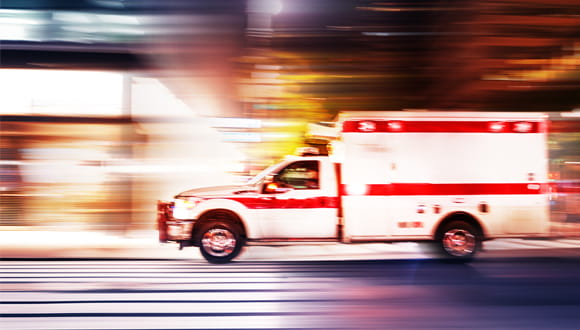How to Handle a Health Emergency During a Natural Disaster
June 1, 2021 - Katie McCallumYou know the emergency room is the safest place to be during a medical emergency.
But what about when a medical emergency happens during a natural disaster? And what if you're not totally sure it's even an emergency?
When roads are closed and/or leaving your home is dangerous, here are two questions to ask when determining how best to handle a medical dilemma:
1. Is this truly a medical emergency?
Time is of the essence during a medical emergency, so it's important to know when exactly you need to act fast — especially during a natural disaster, when emergency services may be limited and calls to 911 should be reserved for true emergencies.
Warning signs of a medical emergency include:
- Chest pain that lasts two minutes or more
- Shortness of breath and/or trouble breathing
- Symptoms of stroke (sudden dizziness, vision changes, difficulty speaking, confusion and weakness, especially on one side)
- Bleeding that cannot be stopped
- Sudden or severe pain
- Coughing or vomiting blood
- Severe and/or persistent vomiting or diarrhea
- Severe allergic reaction (hives, flushed or pale skin, irregular pulse, wheezing, dizziness, nausea or vomiting)
- Bodily trauma, including injury to the neck or spine, severe cuts or severe burns
- Unusual abdominal pain
- Feeling the urge to harm yourself or others
If you or someone around you is showing signs of needing immediate medical attention, call 911. Delaying care during a medical emergency can have serious and debilitating consequences. (Related: An Emergency Is Still an Emergency — Even During the COVID-19 Pandemic)
2. Should you drive to the hospital or call an ambulance?
If immediate medical attention is needed, it's time to consider whether you should call an ambulance or drive to the hospital yourself.
During a natural disaster, unsafe driving conditions are a possibility and it's important to consider whether road conditions or traffic may delay you or someone else from getting to the hospital.
Before choosing to drive to the hospital, consider whether you may be slowed down by:
- Flooded streets
- Road debris
- Ice or snow
- High wind
- Traffic lights and signals not working
If you think unsafe road conditions may delay how fast you can get to an ER, call an ambulance instead. Never drive through floodwater or on a bridge over high, fast-moving water.
Lastly — natural disaster or not — call for an ambulance if you answer 'yes' to any of the following questions:
- Is life or limb in immediate danger?
- Could the person's condition worsen and become life-threatening while driving to the hospital?
- Would this person benefit from the skills or equipment provided by an emergency medical technician (EMT) or paramedic?
- Will moving this person worsen his or her condition?
- Will traffic or distance delay getting this person to the hospital?
Tips for when it's not an emergency but care is still needed
Just because a medical issue doesn't require immediate medical attention doesn't mean it doesn't need to be treated and monitored closely at home. For non-emergency, urgent care needs, you can video chat with a care provider using Houston Methodist Virtual Urgent Care. Once conditions improve and roads are safe again, you can schedule an appointment with your doctor or specialist to address any lingering concerns you might have.
In the meantime, here's some advice for treating minor injuries and illnesses at home.
How to treat minor cuts or scrapes:
- Wash your hands. To prevent infection, clean your hands with soap and water before tending to the wound.
- Stop the bleeding. Apply pressure for several minutes using a clean towel or gauze.
- Disinfect the wound. Rinse with water and clean the area using soap and water, taking care to prevent soap from entering the wound as this can cause irritation.
- Cover the wound. For small wounds, apply a bandage. For large wounds, wrap with gauze and tape.
How to treat minor burns:
- Reduce swelling. Run the burned area under cool water for about five minutes.
- Soothe the area. Apply antibiotic ointment, petroleum jelly or aloe.
- Protect the area. Loosely wrap the burn with clean gauze.
- Take a pain reliever if needed.
How to treat mild illness at home:
- Give your body what it needs to fight the infection. Get plenty of rest, drink plenty of water and eat well-balanced meals.
- Take over-the-counter medicine as needed. If you have a fever, you can take a fever reducer, such as acetaminophen, to help bring it down. If you have body aches, a sore throat or severe cough, a pain reliever can help lessen the discomfort these symptoms can bring.
- Monitor your symptoms, especially fever, vomiting and diarrhea. If your fever is higher than 103 degrees Fahrenheit, and especially if you are experiencing changes in your mental status (confusion, hallucinations, convulsions), seek immediate medical attention. If diarrhea or vomiting becomes severe and/or persistent, seek immediate medical attention.
When in doubt or if the person's condition worsens, call 911
When calling 911, tell the operator the details of the person's condition and how you've tried to treat him or her thus far. In some cases, the 911 operator may guide you through the steps to provide safe, appropriate medical care to the person.


